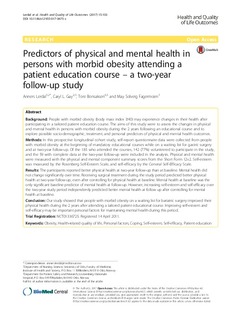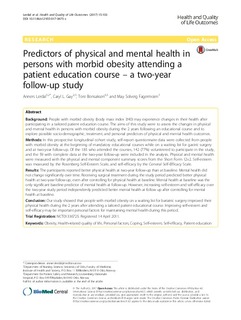| dc.contributor.author | Lerdal, Anners | |
| dc.contributor.author | Gay, Caryl L. | |
| dc.contributor.author | Bonsaksen, Tore | |
| dc.contributor.author | Fagermoen, May Solveig | |
| dc.date.accessioned | 2018-08-15T10:39:21Z | |
| dc.date.available | 2018-08-15T10:39:21Z | |
| dc.date.created | 2017-05-16T10:38:55Z | |
| dc.date.issued | 2017 | |
| dc.identifier.citation | Health and Quality of Life Outcomes. 2017, 15 (1), . | nb_NO |
| dc.identifier.issn | 1477-7525 | |
| dc.identifier.uri | http://hdl.handle.net/11250/2558104 | |
| dc.description.abstract | People with morbid obesity (body mass index ≥ 40) may experience changes in their health after participating in a tailored patient education course. The aims of this study were to assess the changes in physical and mental health in persons with morbid obesity during the 2 years following an educational course and to explore possible socio-demographic, treatment, and personal predictors of physical and mental health outcomes.
In this prospective longitudinal cohort study, self-report questionnaire data were collected from people with morbid obesity at the beginning of mandatory educational courses while on a waiting list for gastric surgery and at two-year follow-up. Of the 185 who attended the courses, 142 (77%) volunteered to participate in the study, and the 59 with complete data at the two-year follow-up were included in the analysis. Physical and mental health were measured with the physical and mental component summary scores from the Short Form 12v2. Self-esteem was measured by the Rosenberg Self-Esteem Scale, and self-efficacy by the General Self-Efficacy Scale.
The participants reported better physical health at two-year follow-up than at baseline. Mental health did not change significantly over time. Receiving surgical treatment during the study period predicted better physical health at two-year follow-up, even after controlling for physical health at baseline. Mental health at baseline was the only significant baseline predictor of mental health at follow-up. However, increasing self-esteem and self-efficacy over the two-year study period independently predicted better mental health at follow up after controlling for mental health at baseline.
Our study showed that people with morbid obesity on a waiting list for bariatric surgery improved their physical health during the 2 years after attending a tailored patient educational course. Improving self-esteem and self-efficacy may be important personal factors for maintaining mental health during this period. | nb_NO |
| dc.language.iso | eng | nb_NO |
| dc.publisher | BioMed Central | nb_NO |
| dc.subject | obesity | nb_NO |
| dc.subject | health-related quality of life | nb_NO |
| dc.subject | personal factors | nb_NO |
| dc.subject | coping | nb_NO |
| dc.subject | self-esteem | nb_NO |
| dc.subject | self-efficacy | nb_NO |
| dc.subject | patient education | nb_NO |
| dc.subject | fedme | nb_NO |
| dc.subject | overvekt | nb_NO |
| dc.subject | mestring | nb_NO |
| dc.subject | selvtillit | nb_NO |
| dc.subject | selvfølelse | nb_NO |
| dc.subject | pasientundervisning | nb_NO |
| dc.title | Predictors of physical and mental health in persons with morbid obesity attending a patient education course - a two-year follow-up study | nb_NO |
| dc.type | Journal article | nb_NO |
| dc.type | Peer reviewed | nb_NO |
| dc.description.version | publishedVersion | nb_NO |
| dc.rights.holder | Open Access | nb_NO |
| dc.source.volume | 15 | nb_NO |
| dc.source.journal | Health and Quality of Life Outcomes | nb_NO |
| dc.source.issue | 1 | nb_NO |
| dc.identifier.doi | 10.1186/s12955-017-0675-z | |
| dc.identifier.cristin | 1470435 | |
| cristin.unitcode | 251,3,0,0 | |
| cristin.unitname | Fakultet for helsefag | |
| cristin.ispublished | true | |
| cristin.fulltext | original | |
| cristin.qualitycode | 1 | |

